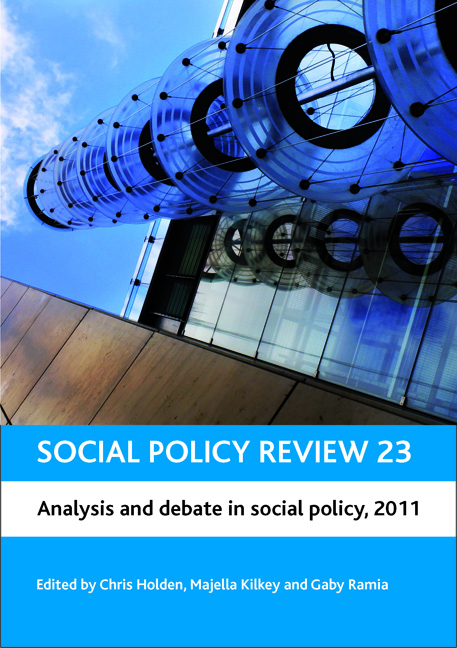nine - A treble blow? Child poverty in 2010 and beyond
Published online by Cambridge University Press: 01 September 2022
Summary
Introduction
The aim of this chapter is to review developments that affected child poverty in 2010, and there is no shortage of things to say. Let us start with the good news. In March 2010 the UK took the unusual step of legislating to eradicate child poverty, placing a duty on the Secretary of State to meet four child poverty targets by 2020/21 (including a relative low income target), and requiring the UK government to produce a regular child poverty strategy as well as annual progress reports. After a general election during which all the major parties agreed on at least the aspiration of eradicating child poverty by 2020, the new Prime Minister David Cameron confirmed in Parliament in July 2010 that his Coalition administration was ‘absolutely committed to meeting the child poverty targets’ (see Hansard records, 7 July 2010). Also encouraging is the fact that the most recent data shows a reduction in child poverty between 2007/08 and 2008/09 – the first such decline since 2005 (Joyce et al, 2010).
On the other hand, in 2008 the UK entered a recession that the Office for National Statistics has described as the longest and deepest since the Second World War (The Guardian, 22 December 2009), with worrying implications for children in families living close to the poverty line, especially those with one earner perhaps in precarious employment. In addition, the country faces a structural deficit that would have made cuts in public spending inevitable whichever Party had won the 2010 General Election. The outlook has been exacerbated by the election of a Conservative–Liberal Democrat Coalition government which has pledged to cut further and faster than many had expected (or think necessary), and has indicated that it will do so in ways which may have more serious consequences for poor children than alternative strategies, in terms of the consequences for both income distribution and long-term investment in children's services. Further, there are signs that the measurement of child poverty may itself come under review, with more emphasis on indicators of parenting and family environment and a reduced focus on income-based measures as a result of the recommendations in Frank Field's Independent Review on Poverty and Life Chances (Field, 2010).
- Type
- Chapter
- Information
- Social Policy Review 23Analysis and Debate in Social Policy, 2011, pp. 165 - 184Publisher: Bristol University PressPrint publication year: 2011

